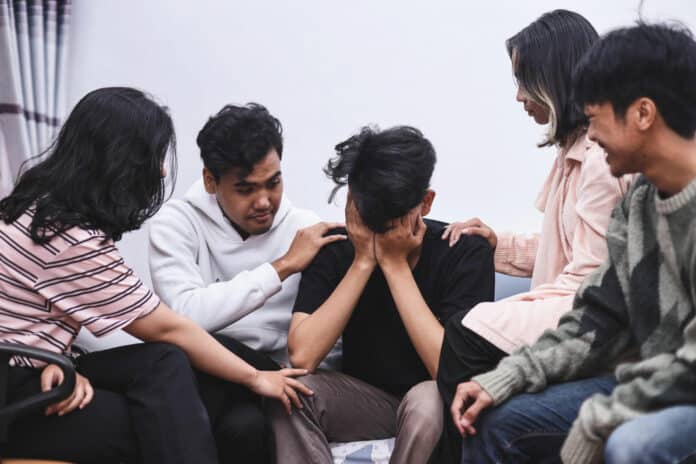Of those who asked for help, 35% said they had to wait or had yet to get it. A study of over 11,000 people aged 17-18 found that young folks in the poorest areas are 11% more likely to be still waiting or not getting the help they asked for than those in wealthier neighborhoods (39% vs. 28%).
The gap regarding specialized mental health services like NHS Child and Adolescent Mental Health Services (CAMHS) is even more significant. In poorer areas, more than twice as many young people (39%) have yet to receive or are still waiting for this kind of support, compared to wealthier areas where it’s only 18%.
The new info is from the COSMO study, the biggest of its kind, checking the impact of Covid-19 on education, well-being, and social mobility. The study found that 44% of Year 13s (students in their final year of school) felt stressed between November 2022 and April 2023. This is the same as last year and higher than in 2017 and 2007. This shows that the mental health of today’s students is worse than in the past.
Also, more students are missing school now (22% compared to 13% before the pandemic), connected to higher stress levels. The study says it’s super important to support those feeling very stressed so they don’t miss too much school and learning time.
Over 1 in 4 students (28%) feel their mental health support in school isn’t good enough. State school students are twice as likely as private school students to say this (32% vs. 16%). This shows a significant gap in access to mental health help, especially for those in the poorest parts of England. This inequality could have long-term effects on the opportunities of disadvantaged young people.
The study also reveals that non-binary+ young people (67%) and girls (33%) are more likely to seek mental health support than boys (15%). It shows that bullying and harassment related to identity are more common for marginalized groups, including ethnic minorities (15% of Black participants faced harassment about their ethnicity) and those outside the gender binary (44% of non-binary+ students faced harassment about their gender identity). Interestingly, White and mixed/other nationalities with high psychological distress were more likely to seek mental health support compared to Asian and Black respondents.
The COSMO study, supported by the Economic and Social Research Council, monitors over 11,000 young people in England. These students recently finished A Level exams and were supposed to start university or work this fall.
The report suggests more support for young people with mental health issues, especially in poorer areas. It also calls for schools to provide specific help for non-binary+ and LGBTQ+ students with input from trained professionals who understand their needs.
Dr. Jake Anders, Associate Professor and Deputy Director of the UCL Centre for Education Policy and Equalising Opportunities (CEPEO) and COSMO’s Principal Investigator said: “The scale of the crisis in young people’s mental health is already well known. But these new findings from COSMO show that we need to do more to tackle it. It is vital that we properly resource mental health services across the country. There is no quick, cheap fix to achieving that.”
“We must also ensure that these services are targeted to the most need. If more young people living in worse-off areas are not receiving the support that they need, this will widen existing gaps in life chances.” He added.
Sir Peter Lampl, Founder of the Sutton Trust, highlights the severe mental health crisis among young people, especially those facing disruptions from the pandemic. He expresses concern that youngsters from poor and working-class backgrounds are having the most difficulty getting mental health support. Lampl urges for sustained and well-funded support, emphasizing the need for preventative measures and early intervention. He advocates explicitly for increased support in the most deprived areas to improve access to mental health assistance.
These findings underscore the urgent need to address the challenges young people in deprived areas face in accessing mental health support. The study advocates for targeted interventions and improved services to bridge the gap in support, recognizing the potential long-term consequences on the life chances of disadvantaged youth.
Reference:
- Erica Holt-White, Kevin Latham, et al., Briefing No. 1 – Mental and physical health. Title: https://cosmostudy.uk/publications/mental-and-physical-health.
